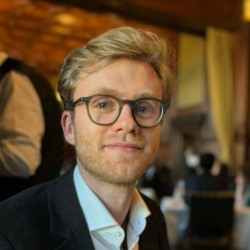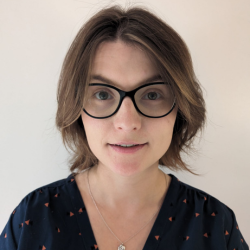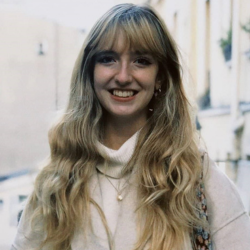Lukas Gunschera
2nd Year PhD
MRC Cognition and Brain Sciences Unit
Social media, Cognitive neuroscience, Addiction
I am a PhD student interested in the cognitive and social mechanisms that link social media use and mental health. My current research examines the cognitive and computational mechanisms that render individuals more susceptible to the aversive outcomes of social media use. Moreover, I am doing experimental and theoretical work on the concept of "social media addiction". My research approach involves a combination of computational and longitudinal methods to examine these relationships across development.
Maggie Szymanska
2nd Year PhD
MRC Cognition and Brain Sciences Unit
Pain, Brain stimulation, Behavioural
I am a 2nd year PhD student investigating phantom limb pain (PLP), a chronic pain condition affecting the majority of people who undergo an amputation. I am currently using behavioural experiments and TMS to explore the cognitive and peripheral mechanisms underlying PLP. I have also used fmri in the past to answer questions about brain reorganisation (or lack of brain reorganisation). I am also learning how to use computational modelling to gain a deeper understanding and additional insights from the data I collect.
Viktorija Smith
1st Year PhD
MRC Cognition and Brain Sciences Unit
Dementia, Neuroimaging, Cognition
I am a Wellcome Trust Fellow and speech and language therapist, interested in investigating the neural correlates of linguistic variation in dementia. Before beginning my PhD, I trained as a speech and language therapist in London, working across acute, rehabilitation, and outpatient settings with a specialisation in adult neurology. Later, as a data analyst in the Mormino and Poston labs at Stanford University, I developed expertise in working with large multi-cohort datasets and PET imaging, focusing on Alzheimer’s disease pathology.
My research aims to characterise cognitive-linguistic profiles across Alzheimer's and Frontotemporal dementia as a continuum. By integrating multimodal neuroimaging, biomarkers, and neuropathology, I aim to elucidate the pathophysiological and neurocognitive mechanisms underlying heterogeneity in these conditions.
Sara Mehrhof
1st Year PostDoc
MRC Cognition and Brain Sciences Unit
Neuropsychiatric disorders, Reward processing, Computational modelling
Hi, I'm Sara, a postdoctoral researcher. In my research, I utilise computational modelling to investigate the cognitive mechanisms underlying motivational deficits and explore how these may be linked to neuropsychiatric disorders and physiological processes.
Victoria Poulton
PhD Graduate
MRC Cognition and Brain Sciences Unit
Language, Speech perception, Neuroimaging
I'm a recent PhD graduate and a researcher of spoken language comprehension. My work sits on the intersection of linguistics, cognitive science, neuroimaging, and experimental psychology.
Blanca Piera Pi-Sunyer
4th Year PhD
Department of Psychology
Adolescence, Socioemotional development, Social inequality
I am a Gates Cambridge Scholar, part of the MRC Doctoral Training Programme. In collaboration with the University of Cambridge and the University of the Basque Country, my interdisciplinary research aims to understand the roles of peer and friendship groups, family support, and neighbourhood cohesion in adolescent mental health. I have a background in psychology and social sciences, with a Major in Psychology (BSc in Politics, Psychology, Law, and Economics, University of Amsterdam, 2018), and a specialisation in cognitive neuroscience (MRes in Cognitive Neuroscience, University College London, 2019).
Marina Rodriguez Lopez
2nd Year PhD
Department of Psychology
Compulsivity, Stress, Animal models
I am a 2nd year PhD student in Behavioural Neuroscience at the University of Cambridge, working with animal models of mental health. My research investigates the relationship between stress and compulsivity using behavioural and neuropharmacological approaches. I focus on how different stress factors (e.g., the nature, duration, and intensity of the stressful experience) influence the emergence and severity of compulsive behaviours. I’m particularly interested in translational research that bridges preclinical models with clinical questions, particularly in OCD and related conditions.
Ellen Taylor-Bower
3rd Year PhD
Department of Psychology
Autism, Mixed-methods, Lived-experience
I am a 3rd year PhD researcher based in the Health and Wellbeing Research Group and the Cambridge Laboratory for Research into Autism (CLaRA). My research utilises both quantitative and qualitative methods to develop a better understanding of autistic adults’ lived experiences of sensory overload, shutdown, and meltdown. Taking a participatory and collaborative approach, including working closely with a dedicated Research Advisory Group, I aim to demonstrate how autistic-led autism research can benefit academic research and clinical practice and help rebuild trust with autistic communities.
Eddie Xiao
2nd Year PhD
Department of Psychology
Eye-tracking, Anxiety, Learning
I am a member of the Prediction and Learning lab, where we study how people build expectations about the world and how alterations in this process might lead to mental health conditions. In my PhD, I created behavioural tasks that assess how people learn in uncertain environments, and I use eye-tracking to measure attention allocation and fluctuations in pupil size. I use these tasks to study how unexpected events affect how people gather information and investigate whether anxiety is related to altered beliefs about uncertainty. My day-to-day work involves a lot of coding, and I am interested in making code approachable and helping others develop programming skills.
Emily Todd
1st Year PhD
MRC Cognition and Brain Sciences Unit
Neuroimaging, Neuropsychology, Dementia
My name is Emily, and I am a 1st year PhD student in James Rowes' lab. I have a background in structural neuroimaging in frontotemporal dementia, and I am now investigating synaptic changes in frontotemporal dementia and progressive supranuclear palsy. I look forward to hearing your proposals and having a good old natter about science and research life!
Millie Preece
2nd Year PhD
Department of Psychology
Reinforcement learning, Cognitive maps, Psychosis
I'm Millie, a 2nd year PhD student in the Health Neuroscience Lab. I work with an interdisciplinary team of game developers and scientists to investigate how video games can measure cognition and whether this may provide a digital phenotype relevant to clinical symptoms (mainly psychosis). I am also interested in computational modelling and cognitive maps, which I explore through both behavioural tasks and intracranial electrode recordings.
Maxime Janbon
2nd Year PhD
Department of Psychology
Animal neuroscience, Computational neuroscience, and Complexity
I'm a second-year PhD student at the intersection of animal and computational neuroscience. I am studying fruit fly neural recordings to see how these tiny brains encode unexpected stimuli, and mouse brain recordings to understand how different brain areas interact during decision making.
Rebecca Myers
4th Year PhD
Department of Psychology
Individual differences, Maths cognition, Psychometrics
I am a PhD student in Psychology at the Centre for Neuroscience in Education, with a background in psychology, education and mathematics. My current research explores the role of individual differences in exceptional mathematics, focusing on the cognitive, affective and personality predictors of mathematical creativity, giftedness and expertise. Alongside my PhD, I actively participate in science communication, outreach, and widening participation.
Maria Jelen
1st Year PhD
MRC Cognition and Brain Sciences Unit
Psychopathology, Neuroimaging, Data science
I am interested in the development of brain networks in childhood and adolescence, and how this relates to the emergence of mental health problems during this period. By applying computational modelling to longitudinal, large-scale cohort data, I aim to gain a deeper understanding of psychopathology beyond diagnosis and to explore what atypical functional network development can reveal about the risk of psychopathology.





